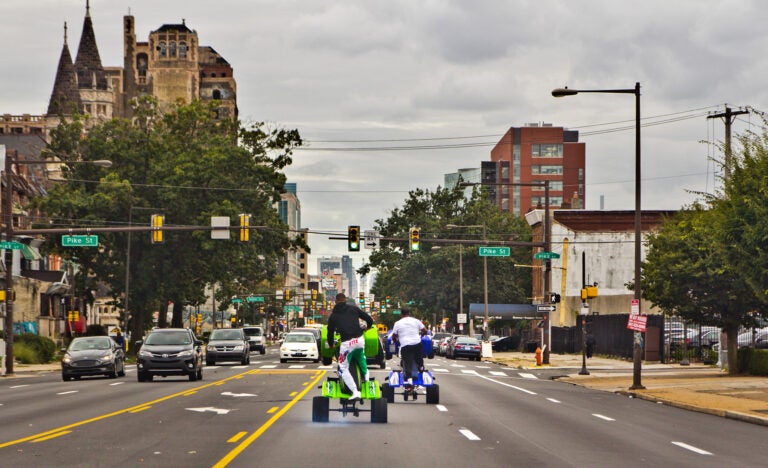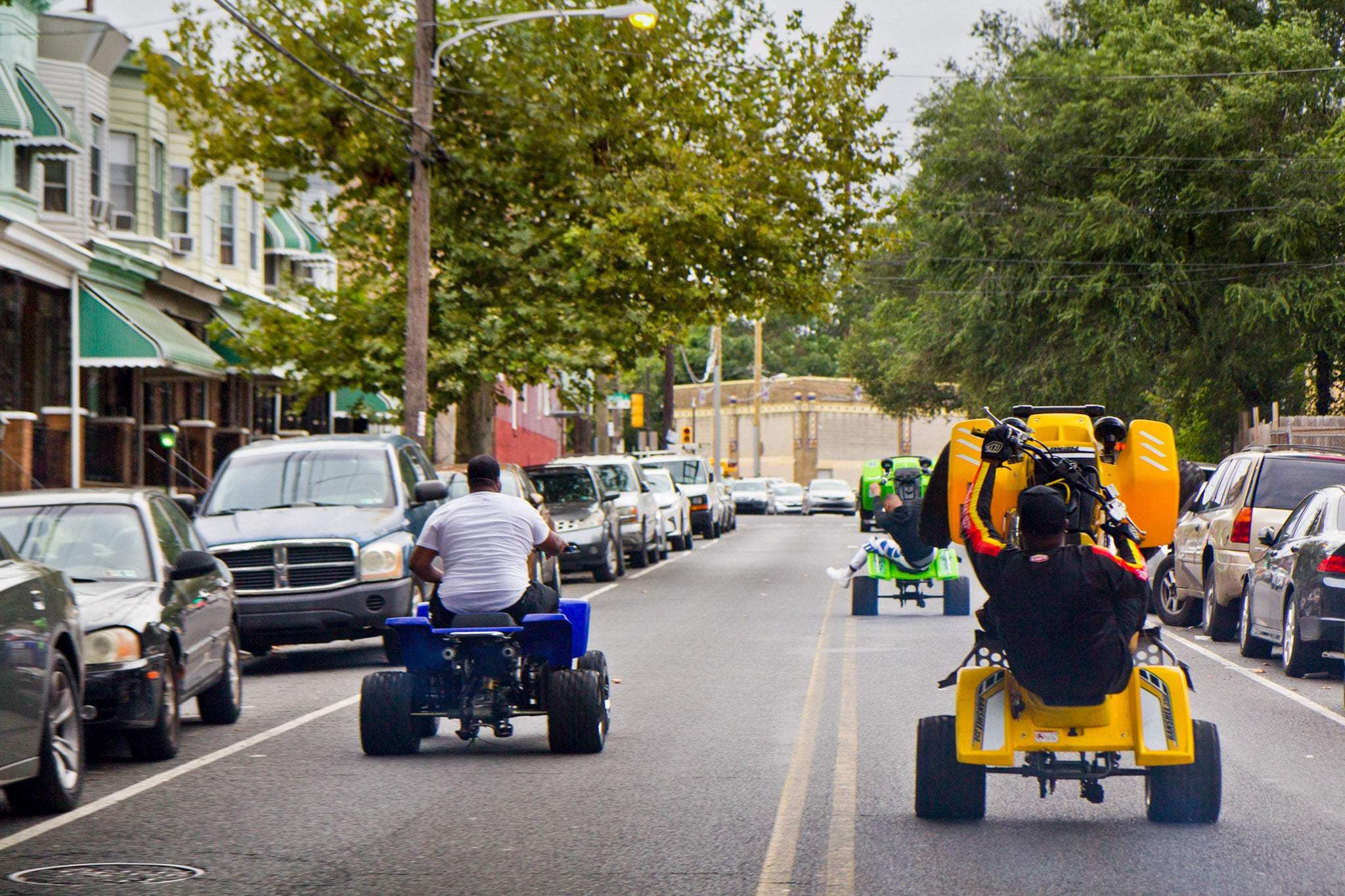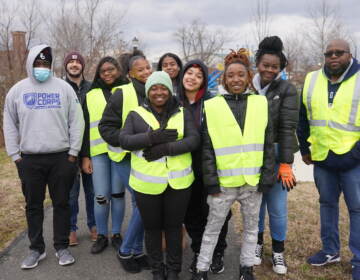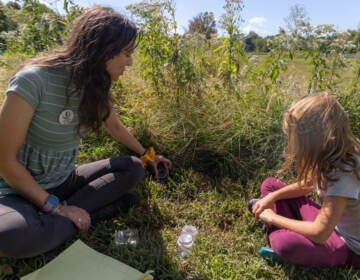Don’t criminalize Philly’s dirt bike culture — build a park so it can thrive
Building an ATV park could help the city fight several public health crises at once.

Young people riding ATVs through the streets of Philly. (Kimberly Paynter/WHYY)
The ATVs speed down city streets and disturb people who see the riders standing up on their bikes in defiance of gravity and traffic law as “menacing.” Young Black men on dirt bikes pop wheelies for blocks as people around them call 911 on the riders and try to block the rumble of engine and speaker systems. These are the scenes discussed on local news and in City Council when the topic of Philly’s hugely popular #bikelife culture comes up — and guess what, it’s time to change the conversation.
Philadelphia is spending hard-earned tax dollars responding to panicked 911 calls, confiscating ATVs and trying to “enforce” away the thriving and illegal subculture Meek Mill put on the national stage. I’m here to say, the enforcement dollars deserve to be spent elsewhere; bike culture is not disappearing and in fact, it shouldn’t — it should move to a park where riders can enjoy their sport legally.
Riders have literally spent years honing their skills, practicing their moves, building up their resume via Instagram, blowing up their street reputation. At this point, dirt bikes are part of urban hip-hop culture, and the skill level of the riders borders on the supernatural. On any given day, a person can stand on a corner of Broad St. or Ridge Ave. and watch riders standing up on their bikes, doing death-defying tricks, tilting ATVs into the air at impossible angles and swirling in intricate formations.
Criminalizing their activity, confiscating their vehicles, handing out tickets with onerous fines, surrounding gas stations when they are refueling, treating riders as if they were public enemies is the wrong approach.
A speeding ATV on city streets is dangerous, but gun violence takes many more lives than dirt bikes each year. Building an ATV park could help the city fight several public health crises at once; We could get dangerous riders off public streets and at the same time, create a space for people to express their youthful exuberance — legally.
If young people are doing what they love — riding — they are not engaged in antisocial activities. Beefs between neighborhood groups and individuals would be lessened as bike riding takes precedent. Gun violence rates would drop as people get to know each other and begin to communicate better in an environment they control and love. Motorists and neighbors who are so insistent against the vehicles would be spared the sight and sound of the riders.
Honoring the culture of ATV and dirt bike riding could create an entirely new atmosphere in the city. Sprawling Fairmount Park with many underused areas could become the home of weekly events featuring music and contests of skill.

Neighborhoods and individuals could compete and corporate sponsors could be engaged to organize the competitions. Shoe and apparel companies could hire the best riders to represent their brands, bringing needed economic opportunity.
Hip-hop artists who are a part of the culture could endorse the park and bring their celebrity status to elevate the events. Imagine Meek Mill, Da Baby, Lil Durk, King Von, Drake, Chris Brown, Cardi B and Megan Thee Stallion judging the competition. Philly could become the genesis of a multi-million industry that changes the face of riding. Philadelphia could lead other cities in solving a problem by turning it into an asset.
Some of the fears that surround dirt bike and ATV riders are warranted — they can take over the streets oblivious to traffic laws and that is a real problem that can’t be minimized. But what is equally problematic is the fact that an entire subculture — a Black subculture— is being criminalized.
This criminalization is part of a racist cycle. No one says we need to get these Black kids and the white kids they are influencing off the street. Instead they use code words: “gangs” of ATVs”; “illegal activity”; “menacing”; “reckless joyriders”; ”swarms of riders.” But bike riders are not insects. More often than not, they do not seek to disrupt the city, they seek to enjoy it. The challenge for city leaders is how to channel this activity in positive ways, how to move this activity out of the realm of illegality and into the sphere of a performance sport like NASCAR.
Police and city residents complain that these vehicles have no headlights or brake lights, no turn signals, no license plates, or insurance. The riders can not be held accountable for their actions. That’s because the vehicles are designed for off the road activity. Which brings us to the next issue: Since these vehicles are made for all-terrain activity, why can’t the city designate areas where it can safely and legally take place?
A bike park that would accommodate the riders
What would it take? We would need enlightened thinking on the part of Philadelphia City Council members, Mayor Jim Kenney, Police Chief Danielle Outlaw and city residents to designate park space for riders.
The problem of how riders would travel to the park would have to be resolved. The city would have to invest in sufficient insurance to cover the risk of riders on city park property. Most importantly, riders would have to commit to following traffic laws as they travel to the riding area and stay off city streets otherwise.
City Council Members Curtis Jones, Kenyatta Johnson and Helen Gym have expressed support for the idea in the past. Recently Allan Domb called for a Public Safety Committee Hearing on the issue. Mark Squilla has expressed support with some reservations. If new members Isiah Thomas, Kendra Brooks, and Jamie Gauthier sign on along with visionary thinker Derek Green, it is a wrap. City Council President Darrell Clarke needs to show leadership on this issue and support the effort. Those are the necessary votes to create a new day in Philly. Is it possible for once that adults are truly conscious of the desires, and dreams of the young and move to make it happen? Is our city up to the challenge?
Jondhi Harrell is a community activist and the executive director of The Center for Returning Citizens Community Healing Center at 3609 N. Broad St in North Philadelphia.

Subscribe to PlanPhilly
WHYY is your source for fact-based, in-depth journalism and information. As a nonprofit organization, we rely on financial support from readers like you. Please give today.







